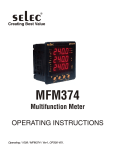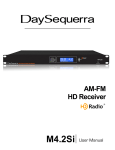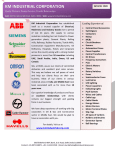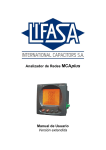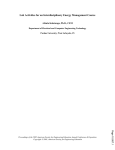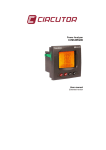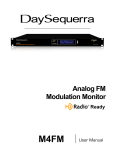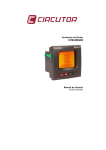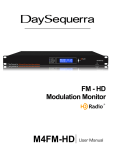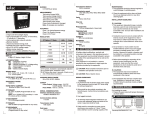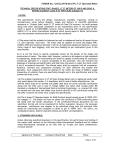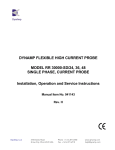Download OP_MFM384-MFM384-C_OP278-V01A_web
Transcript
Multifunction Meter selec Creating Best Value MFM384 OPERATING INSTRUCTIONS Operating / 1008 / MFM384 / Ver1A, OP278-V01A. Content selec 1. INTRODUCTION 1.1 About MFM384.............................................................................................. 01 1.2 Overview........................................................................................................ 02 1.3 Technical Overview........................................................................................ 04 1.4 Installation Guide........................................................................................... 08 1.5 Wiring Guide.................................................................................................. 12 2. HUMAN MACHINE INTERFACE (HMI)............................................................. 16 3. CONFIGURATION.............................................................................................. 23 4. APPLICATIONS................................................................................................. 34 5. COMMUNICATION 5.1 Modbus Parameter....................................................................................... 35 6. USER GUIDE..................................................................................................... 45 7. CONFIG RECORD SHEET................................................................................ 46 Introduction selec ABOUT MFM384 A suitable meter for the measurement of parameters such as voltage, current, power factor, frequency, power and energy. Features such as pulse output, communication are available thereby providing a complete solution for many measurement needs. APPLICATIONS: 1. Electric Automation SCADA System: MFM384 can be used as Remote Terminal Unit (RTU) for monitoring purpose in a SCADA System. All measured data is available through RS485 communication ports with the Modbus Protocol. 2. Energy Management System / Building Management System: MFM384 can be used to monitor power and energy parameters of an organization which can be transmitted to main control room through RS485 3. Heavy Industries: MFM384 is a suitable meter for heavy industries because of its ability to function even in rough conditions. 4. Power Transmission and Distribution field 5. Power System Protection Field 6. Industry Automation 7. Large UPS System Note: Please read this manual carefully & completely before installing / operating MFM384. Specifications subject to change as development is a continuous process 01 Introduction selec Overview SALIENT FEATURES Ø 4 lines, 4 digits per line, 8 digits for energy Ø Bar graph for current indication Ø Network supported: 1 Ø 2 wire, 2 Ø 3 wire, 3 Ø 3 wire, 3 Ø 4 wire Ø User programmable network selection Ø LCD with backlight Ø User programmable ON time for backlight Ø Auto / manual page scrolling Ø User programmable page sequence for page displayed in auto mode Ø Measures all electrical parameters (RMS Voltage, Current, Active power, Reactive power, Apparent power, Power factor, Frequency, Active energy, Reactive energy & Apparent energy,DMD (Min / Max Active Power,Min / Max Reactive Power, Max Apparent power) ) Ø Programmable CT/ PT primary, CT/PT secondary Ø Memory retention for ten years Ø Potential free Pulse output for energy Ø 85 to 270V AC auxiliary supply Ø RS485 communication (MODBUS Protocol), (Optional) Ø Protection covering for terminal screws ORDER CODE Ø MFM384 Ø MFM384-C (with Communication) 02 selec Introduction Overview Display & Key description 3 1. Bargraph Display current in bargraph format 7 MAX 8 1 2. 4 lines of seven segment digits in metering area Display parameters such as voltage, Current, Power factor, Power & Frequency 2 9 DMD 4 6 5 3. Unit (V, A, PF, Hz, kW, kVAr, kVA) Indicates unit of parameter displayed Voltage: V, kV Active Power: kW, MW Apparent power: kVA, MVA Active energy: kWh, MWh Apparent energy: kVAh, MVAh | | | | | Current: A Reactive power: kVAr, MVAr Frequency: Hz, Reactive energy: kVArh, MVArh Demand: DMD 4. Integration of energy: Energy accumulation indication 5. Keypad: keypad with six dual function keys (HMI or Programming) 6. Energy: 8 dedicated digits for energy (Active, Reactive & Apparent) 7. Backlight: Backlight LCD display (ON/OFF time programable, auto ON on key press) 8. Phase (1, 2, 3, 1-2, 2-3, 3-1) : Display phase to neutral or phase to phase values 9. Demand : Maximum & Minimum demand of power 03 selec Introduction Technical Overview Functional Descriptions Description Display LCD Indications MFM384 Liquid crystal display with backlight 4 lines, 4 digits per line to show electrical parameters 5th line, 8 digits to show energy Bar graph for current indication INT :Integration of energy PRG : Unit is in configuration menu : This symbol indicates communication is in progress DMD : Maximum Demand for Power Display update time 1 sec for all parameters Display Scrolling Auto / Manual Online Pages Customized page selection from available standard pages (selection via configuration menu) Input Point Electrical Specification Electrical input type 1 Ø 2 wire, 2 Ø 3 wire, 3 Ø 3 wire, 3 Ø 4 wire Rated input voltage 11 to 300V AC max phase to neutral 19 to 519V AC max phase to phase Rated input current Nominal 5A AC (11mA minimun) 6A max Frequency range 45 to 65 Hz CT Primary 1A or 5A to 10,000A (Programmable for any value) Note: 1A to 10,000A if CT secondary is 1 else CT primary is 5A to 10,000A CT Secondary Programmable 1A or 5A PT Primary 100V to 500kV (Programmable for any value) PT Secondary 100 to 500V AC (L-L) Programmable for any value Burden 0.5 VA per phase @ 5A 04 selec Introduction Serial Communication [ Applicable for MFM384-C / MFM384-C-230V ] Interface standard & protocol MODBUS RTU protocol over RS485 Communication address 1 to 255 Transmission mode Half duplex Data types Float and Integer Transmission distance 500 m maximum Transmission speed 300, 600,1200, 2400, 4800, 9600,19200 (in bps) Parity None, Odd, Even Stop bits 1 or 2 Response time 100 ms (Independent of baud rate) Pulse Output Pulse Output (type) Opto-Isolated Pulse Voltage 24V DC max. Pulse Current 100mA max. Pulse Width 100 ms ± 50 ms. General Specification Auxiliary Supply 85 to 270V AC/DC Operating frequency 50/60Hz Power Consumption 0.5 VA max.@5A per phase Temperature Operating temperature: 0 to +50oC Storage temperature: -20 to +75oC Humidity 95% (non condensing) Mounting Panel mounting Weight MFM384 / MFM384-C : 318gms MFM384-230V / MFM384-C-230V : 362gms 05 selec Introduction Parameter Measured / Calculated Parameters Measured values All average and phase to phase and phase to neutral voltage Unit Current All phases and average current A Active Power kW1, kW2, kW3 and Total kW kW Reactive Power kVAr1, kVAr2, kVAr3 and Total kVAr kVAr Apparent Power kVA1, kVA2, kVA3 and Total kVA kVA Power Factor Individual and average - Frequency Frequency of available phase Hz Active Energy Total of all phases kWh Reactive Energy Total of all phases kVArh Apparent Energy Total of all phases kVAh DMD Maximum & Minimum demand of power P, Q, S Voltage V Resolution Table PT Ratio x CT Ratio kWh/ kVAh/ kVArh Pulse <15 0.01K 0.01K <150 0.1K 0.1K <1500 1K 1K <15000 0.01M 0.01M <150000 0.1M 0.1M ≥1500000 1M 1M NOTE: 1) For voltage, Current, Power, resolution is automatically adjusted 2) For power factor, resolution is 0.001 3) INT blinks after every 5 seconds, if load is connected on any one of 3 phase 06 selec Introduction Accuracy : Measurement Accuracy Voltage VL-N ±0.5% of Full scale Voltage VL-L ±0.5% of Full scale Average Voltage L-N ±0.5% of Full scale Average Voltage L-L ±0.5% of Full scale Current ±0.5% of Full scale Average current ±0.5% of Full scale Frequency ±0.1% For Voltage >20V L-N, For Voltage >35V L-L Active Power Class 1 Apparent power Class 1 Reactive Power Class 1 Power factor and Avg Power Factor ±0.01 Active energy Class 1 Reactive energy Class 1 Apparent energy Class 1 MAX / MIN Active Power 1% MAX / MIN Reactive Power 1% MAX Apparent Power 1% Toll free: 1800 227 353 Phone: 91-22-28471 1882 / 4039 4200 / 4039 4202 Email: [email protected] 07 Introduction selec Installation Guide Safety Precautions All safety related codifications, symbols and instructions that appear in this operating manual or on the equipment must be strictly followed to ensure the safety of the operating personnel as well as the instrument. If the equipment is not handled in a manner specified by the manufacturer it might impair the protection provided by the equipment. CAUTION: Read complete instructions prior to installation and operation of the unit. CAUTION: Risk of electric shock. WIRING GUIDELINES WARNING: 1. To prevent the risk of electric shock power supply to the equipment must be kept OFF while doing the wiring arrangement. 2. Wiring shall be done strictly according to the terminal layout. Confirm that all connections are correct. 3. Use lugged terminals. 4. To eliminate electromagnetic interference use of wires with adequate ratings and twists of the same in equal size shall be made. 5. Cable used for connection to power source, must have a cross section of 1.5mm2. These wires shall have current carrying capacity of 6A. 6. The following safety earth symbol is used in this user’s manual 08 Introduction selec Maintenance 1. The equipment should be cleaned regularly to avoid blockage of ventilating parts. 2. Clean the equipment with a clean soft cloth. Do not use Isopropyl alcohol or any other cleaning agent. Installation Guidelines CAUTION: 1. This equipment, being built-in-type, normally becomes a part of main control panel and in such case, the terminals do not remain accessible to the end user after installation and internal wiring. 2. Conductors must not come in contact with the internal circuitry of the equipment or else it may lead to a safety hazard that may in turn endanger life or cause electrical shock to the operator. 3. Circuit breaker or mains switch must be installed between power source and supply terminals to facilitate power 'ON' or ‘OFF’ function. However this switch or breaker must be installed in a convenient position normally accessible to the operator. 4. Before disconnecting the secondary of the external current transformer from the equipment, make sure that the current transformer is short circuited to avoid risk of electrical shock and injury. CAUTION: 1. The equipment shall not be installed in environmental conditions other than those mentioned in this manual. 2. The equipment does not have a built-in-type fuse. Installation of external fuse of rating 275V AC/0.5Amp for electrical circuitry is highly recommended. 09 selec Introduction Mechanical Installation For installing the controller 1. Prepare the panel cutout with proper dimensions as shown. Tolerance of cutout ± 0.5mm. 90.5 91.5 99 99 Front bezel 5 50 Side view 91.5 Panel Cutout 2. Push the meter into the panel cutout. Secure the meter in its place by pushing the clamp on the rear side. The screws, of the pane of the clamp, must be in the farthest forward slot. 3. For proper sealing, tighten the screws evenly with required torque. 4. Recommended conductor cross section = 1.5mm2 Terminal screw tightening torque = 0.5 N-m Screw clamp tightening torque = 0.1N-m CAUTION: The equipment in its installed state must not come in close proximity to any heating sources, caustic vapors, oils, steam, or other unwanted process byproducts. EMC Guidelines EMC Guidelines: 1. Use proper input power cables with shortest connections and twisted type. 2. Layout of connecting cables shall be away from any internal EMI source. SERVICE DETAILS This device contains no user serviceable parts and requires special equipment and specialized engineers for repair. NO WARRANTY ON UNIT DAMAGED DUE TO WRONG INPUT / OUTPUT WIRING CONNECTION. 10 selec Introduction Terminal Diagram MFM384 / MFM384-230V N L + PULSE O/P L1 L2 L3 L O A D N S1 S2 S1 I1 S2 S1 I2 S2 N V1 V2 V3 I3 MFM384-C / MFM384-C-230V N L + + PULSE O/P RS485 L1 L2 L3 L O A D N S1 S2 I1 S1 S2 I2 S1 S2 N V1 V2 V3 I3 11 selec Introduction L1 L2 V1 RS485 N S2 I3 S1 I2 S2 # All fuse types: 0.5A class CC UL type L2 LOAD L1 N 3 Ø - 4 wire, 3 CT’s & 3 PT’s L3 LINE N N S1 I1 L L # S1 S2 + MFM384 + PULSE O/P + + V2 V3 # 0.5A fast acting 600V LOAD N 3 PHASE 4-WIRE (COMMONLY USED) WIRING DIAGRAM 3 Ø - 4 wire, 3 CT’s # All fuse types: 0.5A class CC UL type L3 Wiring guide V1 V2 N I3 LINE L N N S1 S2 I2 S1 S2 I1 S1 S2 + MFM384 RS485 PULSE O/P + # L + + V3 # 0.5A fast acting 600V 12 selec Introduction L2 LOAD L1 3 PHASE 3-WIRE WIRING DIAGRAM 3 Ø - 3 wire, 2 CT’s & 2 PT’s # All fuse types: 0.5A class CC UL type L3 Wiring Guide V1 RS485 N S2 S1 I3 I2 I1 # All fuse types: 0.5A class CC UL type V1 RS485 N S2 I3 S1 S1 S2 I2 LINE I1 L S2 # L N N S1 + MFM384 + PULSE O/P + + V2 V3 # 0.5A fast acting 600V LOAD L1 3 Ø - 3 WIRE, 2 CT’S L2 L3 LINE N N S1 L S2 # L S1 S2 + MFM384 + PULSE O/P + + V2 V3 # 0.5A fast acting 600V 13 selec Introduction L1 L2 LOAD 2 PHASE 3-WIRE WIRING DIAGRAM 2 Ø - 3 wire, 2 CT’s # All fuse types: 0.5A class CC UL type N Wiring Guide # V1 RS485 N S2 I3 S1 I2 S1 S2 + MFM384 PULSE O/P + S2 I1 # V1 RS485 N S2 I3 S2 LINE I1 S1 L N N S1 I2 S1 S2 + MFM384 PULSE O/P + # L + + V2 V3 0.5A fast acting 600V L2 N 2 Ø - 3 wire, 2 CT’s & 2 PT’s # All fuse types: 0.5A class CC UL type LOAD L1 LINE N N S1 L # L + + V2 V3 0.5A fast acting 600V 14 selec Introduction L1 LOAD 1 PHASE 2-WIRE (COMMONLY USED) WIRING DIAGRAM 1 Ø - 2 wire, 1 CT # All fuse types: 0.5A class CC UL type N Wiring Guide N S2 I3 I2 S1 S2 I1 LINE S1 L # L N N S1 S2 MFM384 + # V1 RS485 + PULSE O/P + + V2 V3 0.5A fast acting 600V COMMUNICATION WIRING DIAGRAM 15 selec HMI Online Page Description There are 6 dedicated keys labelled as V, I, VAF, PF, P, E. Use these 6 keys to read meter parameters. Simply press these keys to read the parameters. 01 X1 02 X2 Press V ( ) button, the first screen shows: [ L-N Voltage and Average Voltage (V1, V2, V3 & VAVG.) [ Bargraph indicates amount of % current present in the system (Independent of key press) [ The lower most display shows total energy (kWh, kVArh, kVAh), based on user selection Press V ( ) button, the second screen shows: [ L-L voltage & average L-L voltage (V 1-2, V 2-3, V 3-1, VAVG ) [ Bargraph indicates amount of % current present in the system (Independent of key press) [ The lower most display shows total energy (kWh, kVArh, kVAh), based on user selection Note: In 3 Ø 3 wire system only L-L voltage & average L-L voltage (V 1-2, V 2-3, V 3-1, VAVG ) will be displayed 03 X1 Press I ( ) button, the first screen shows: [ Current (I1, I2, I3) & average current (IAVG ) [ Bargraph indicates amount of % current present in the system (Independent of key press) [ The lower most display shows total energy (kWh, kVArh, kVAh), based on user selection Note: In 3 Ø 3 wire system L-L current & average L-L current (I 1-2, I 2-3, I 3-1, IAVG ) will be displayed 16 selec HMI Online Page Description 04 Press VAF ( ) button, the first screen shows: [ Voltage (L-N), Current, Power factor of first phase (V1, I1, PF1) & Frequency (Hz) [ Bargraph indicates amount of % current present in the system (Independent of key press) [ The lower most display shows total energy (kWh, kVArh, kVAh), based on user selection X1 05 X2 MFM384 Press VAF ( ) button, the second screen shows: [ Voltage (L-N), Current, Power factor of second phase (V2, I2, PF2) & Frequency (Hz) [ Bargraph indicates amount of % current present in the system (Independent of key press) [ The lower most display shows total energy (kWh, kVArh, kVAh), based on user selection 06 X3 Press VAF ( ) button, the third screen shows: [ Voltage (L-N), Current, Power factor of third phase (V3, I3, PF3) & Frequency (Hz) [ Bargraph indicates amount of % current present in the system (Independent of key press) [ The lower most display shows total energy (kWh, kVArh, kVAh), based on user selection 17 selec HMI Online Page Description 07 X4 Press VAF ( ) button, the fourth screen shows: [ Average Voltage (L-N), Current, Power factor of three phase (VAVG, IAVG, PFAVG) & Frequency (Hz) [ Bargraph indicates amount of % current present in the system (Independent of key press) [ The lower most display shows total energy (kWh, kVArh, kVAh), based on user selection Note: In 3 Ø 3 wire system only L-L / AVG voltage, L-L / AVG current, Average PF & Frequency will be displayed 08 X1 Press PF ( ) button, the first screen shows: [ Power factor of each phase (PF1, PF2, PF3) & average power factor (PFAVG) [ Bargraph indicates amount of % current present in the system (Independent of key press) [ The lower most display shows total energy (kWh, kVArh, kVAh), based on user selection Note: In 3 Ø 3 wire system only average power factor will be displayed 09 Press P ( ) button, the first screen shows: [ Active power of each phase (P1, P2, P3) & total power (PSUM) [ Bargraph indicates amount of % current present in the system (Independent of key press) X1 [ The lower most display shows total energy (kWh, kVArh, kVAh), based on user selection Note: For 3 Ø 3 wire system, this page will not be available. 18 selec HMI Online Page Description 10 Press P ( ) button, the second screen shows: [ Reactive power of each phase (Q1, Q2, Q3) & total power (QSUM) [ Bargraph indicates amount of % current present X2 in the system (Independent of key press) [ The lower most display shows total energy (kWh, kVArh, kVAh), based on user selection Note: For 3 Ø 3 wire system, this page will not be available. 11 Press P ( ) button, the third screen shows: [ Apparent power of each phase (S1, S2, S3) & total apparent power (SSUM) [ Bargraph indicates amount of % current present X3 in the system (Independent of key press) [ The lower most display shows total energy (kWh, kVArh, kVAh), based on user selection Note: For 3 Ø 3 wire system, this page will not be available. 12 Press P ( ) button, the fourth screen shows: [ Active, Reactive, Apparent power of first phase (kW1, kVAr1, kVA1) & power factor [ Bargraph indicates amount of % current present X4 in the system (Independent of key press) [ The lower most display shows total energy (kWh, kVArh, kVAh), based on user selection Note: For 3 Ø 3 wire system, this page will not be available. 19 selec HMI Online Page Description 13 Press P ( ) button, the fifth screen shows: [ Active, Reactive, Apparent power of second phase (kW2, kVAr2, kVA2) & power factor [ Bargraph indicates amount of % current present in the system (Independent of key press) X5 [ The lower most display shows total energy (kWh, kVArh, kVAh), based on user selection Note: For 3 Ø 3 wire system, this page will not be available. 14 Press P ( ) button, the sixth screen shows: [ Active, Reactive, Apparent power of third phase (kW3, kVAr3, kVA3) & power factor [ Bargraph indicates amount of % current present in the system (Independent of key press) X6 [ The lower most display shows total energy (kWh, kVArh, kVAh), based on user selection Note: For 3 Ø 3 wire system, this page will not be available. 15 X7 Press P ( ) button, the seventh screen shows: [ Total Active, Reactive, Apparent power of all three phase (kWSUM, kVArSUM, kVASUM) & power factor [ Bargraph indicates amount of % current present in the system (Independent of key press) [ The lower most display shows total energy (kWh, kVArh, kVAh), based on user selection Note: In 3 Ø 3 wire system only total L-L power (kW, kVAr, kVA) will be displayed 20 selec HMI Online Page Description 16 X8 Press P ( ) button, the eighth screen shows: [ Max Active, Reactive, Apparent demand Power (kW, kVAr, kVA) [ Bargraph indicates amount of % current present in the system (Independent of key press) [ The lower most display shows total energy (kWh, kVArh, kVAh), based on user selection Note: In 3 Ø 3 wire system only L-L max demand power (kW, kVAr, kVA) will be displayed 17 X9 Press P ( ) button, the ninth screen shows: [ Min Active, Reactive demand power (kW, kVAr) [ Bargraph indicates amount of % current present in the system (Independent of key press) [ The lower most display shows total energy (kWh, kVArh, kVAh), based on user selection Note: In 3 Ø 3 wire system only L-L min demand power (kW, kVAr, kVA) will be displayed Press E ( ) button, the first screen shows: [ Total active energy on the bottom most display, Irrespective of page being displayed [ Bargraph indicates amount of % current present X1 in the system (Independent of key press) Note: User can toggle between the 3 types of energy parameters (kWh, kVArh, kVAh) irrespective of page being displayed, by pressing E button 21 selec HMI Online Page Description Press E ( ) button, the second screen shows: [ Total apparent energy on the bottom most display, Irrespective of page being displayed X2 [ Bargraph indicates amount of % current present in the system (Independent of key press) Press E ( ) button, the third screen shows: [ Total reactive energy on the bottom most display, Irrespective of page being displayed X3 [ Bargraph indicates amount of % current present A/M Press E ( ) button for 3 seconds to toggle between Auto & Manual mode. Note: By default unit operates in auto mode. In auto mode online pages scrolls automatically at the rate of 5 seconds per page. In auto mode when any key is pressed, unit temporarily switches to manual mode and the appropriate page is displayed, also if no key is pressed for 5 sec, unit resumes auto mode in the system (Independent of key press) 22 selec Configuration Configuration There are 6 dedicated keys labelled as V, I, VAF, PF, P, E. Use these 6 keys to enter into configuration menu / change setting. Note: The settings should be done by a professional, after going through this users manual and understood the application situation. For the configuration setting mode ! Use + keys for 3 sec to enter or exit from the configuration menu. ! Use or keys to move curser left or right by one digit each time. ! Use or keys for increasing or decreasing parameters value ! Use key to go back to previous page ! Use key to save the setting and move on to next page Password for entering into configuration Default Setting: 1000 Range: 0000 to 9998 Note: Access code (Password) needed for getting into configuration menu. Only the person who knows the access code can do the parameter setting Change Password Default Setting: No Range: No / Yes Note: If user want to change default password, make selection as ‘Yes’ and proceed. If selection is ‘No’ then configuration will move on to the network selection page. 23 selec Configuration Configuration New Password Default Setting: 0000 Range: 0000 To 9998 Note: After selecting ‘Yes’ on previous page, user can set new password Use or keys to move curser left or right by one digit each time. Use or keys for increasing or decreasing parameters value Network Selection Default Setting: 3P4W Range: 3P3W and 3P4W Note: Network selection can be done as per wiring diagram given on Pg. no. 11 and selecting appropriate network selection from configuration eg. for 1 Ø 2 wire / 2 Ø 3 wire connection the network selection should be set to 3P4W and user can make the requisite hardwired connection at the terminals CT Secondary Default Setting: 5 A Range: 1A or 5A Note: User can select from 1A and 5A as per external CT specification 24 selec Configuration Configuration CT Primary Default Setting: 5 A Range: 1A, 5A to 10,000A (10.0 kA) Note: As per CT secondary selection, CT primary will be 1A to 10000A or 5A to 10000A (Programmable for all values) PT Secondary Default Setting: 350V Range: 100V to 500V Note: User can select from 100 to 500V as per external PT specification (Programmable for all values) MFM384 PT Primary Default Setting: 350V Range: 100V to 500kV PRG PRG V I VAF A/M PF P Note: User can select PT primary value as per external PT specifications (Programmable for all values) E 25 selec Configuration Configuration MFM384 Slave ID Default Setting : 1 Range: 1 to 255 PRG PRG V I VAF A/M PF P Note: Slave Id is for communication purpose. Each meter on same RS485 network should have different address according to Modbus RTU protocol (Optional, available in MFM384-C only) E MFM384 Baud Rate Default Setting: 9600. Range: 300, 600, 1200, 2400, 4800, 9600 & 19200 PRG PRG V I VAF A/M PF P E Note: The baud rate could be one of the seven, 300, 600, 1200, 2400, 4800, 9600 & 19200 (Optional, available in MFM384-C only) Parity Default Setting: None Range: None, Even, Odd Note: For asynchronous communication, user can select any one of three None, Even, Odd (Optional, available in MFM384-C only) 26 selec Configuration Configuration Stop Bit Default Setting: 1 Range: 1 or 2 Note: For asynchronous communication, user can select any one of two 1 or 2 (Optional, available in MFM384-C only) Backlight Default Setting: 0 sec. Range: 0 to 7200 sec. Note: Backlight remains ON permanently if the time programmed is 0 second. User can switch OFF the backlight by entering a value within the defined range. The backlight switches OFF after the entered time elapses & automatically switches ON for the same duration of time, after key is pressed. In MFM384, the page no. of this page will be displayed as 07 Demand Interval Method Default Setting: Sliding Range: Sliding / Fixed Note: User can select demand interval from sliding or fixed window protocol Refer user guide for the working of above protocol In MFM384, the page no. of this page will be displayed as 08. 27 selec Configuration Configuration Demand Interval Duration Default Setting: 15 Range: 1 to 30 Note: User can change demand duration as per the requirement In MFM384, the page no. of this page will be displayed as 09. Demand Interval Leanght Default Setting: 1 Range: 1 to 30 min Note: User can change demand length as per the requirement In MFM384, the page no. of this page will be displayed as 10 Maximum Auto Page Default Setting: 17 Range: 1 to 17 Note: User can select maximum number of pages being displayed on the unit in auto mode. (For MFM384 Default Setting: 14 Range: 1 to 14 ) In MFM384, the page no. of this page will be displayed as 11. 28 selec Configuration Configuration Change Page Sequence Default Setting: No Range: No / Yes Note: User can change page sequence by selecting ‘Yes’ If option selected is ‘No’ the configuration will move to factory default page. In MFM384, the page no. of this page will be displayed as12. Page Sequence Note: Page sequence depends on maximum page selection. User will be prompted to change page sequence depending upon maximum page selection defined. In MFM384, the page no. of this page will be displayed as 12.01 Factory Default Default Setting: No Range: No / Yes Note: If ‘Yes’ selected unit will be formatted to factory default settings. User should note all previous settings before formatting the unit. In MFM384, the page no. of this page will be displayed as 13. 29 selec Configuration Configuration Reset Default Setting: No Range: No / Yes Note: For resetting energy parameters user has to select ‘Yes’ option If option selected is ‘No’ the configuration will move to change password In MFM384, the page no. of this page will be displayed as 14. Password Default Setting: 1001 Selection: 0000 To 9999 Note: For resetting energy parameters user will be prompted the password. If correct password is entered, the user will be able to reset all energy parameters. This password will be a value which will be greater than the configuration password by 1. In MFM384, the page no. of this page will be displayed as 14.1 Reset Active Energy Default Setting: No Selection: No / Yes Note: User can reset energy by selecting ‘Yes’. User should note the reading before resetting In MFM384, the page no. of this page will be displayed as 14.01 30 selec Configuration Configuration Reset Reactive Energy Default Setting: No Selection: No / Yes Note: User can reset energy by selecting ‘Yes’. User should note the reading before resetting In MFM384, the page no. of this page will be displayed as 14.02 Reset Apparent Energy Default Setting: No Selection: No / Yes Note: User can reset energy by selecting ‘Yes’. User should note the reading before resetting. After pressing enter key configuration will move on to change password page. In MFM384, the page no. of this page will be displayed as 14.03 Reset Max Active Power Default Setting: No Selection: No / Yes Note: User can reset max active power by selecting ‘Yes’. User should note the reading before resetting In MFM384, the page no. of this page will be displayed as 14.04. 31 selec Configuration Configuration Reset Min Active Power Default Setting: No Selection: No / Yes Note: User can reset min active power by selecting ‘Yes’. User should note the reading before resetting In MFM384, the page no. of this page will be displayed as 14.05. Reset Max Reactive Power Default Setting: No Selection: No / Yes Note: User can reset max reactive power by selecting ‘Yes’. User should note the reading before resetting In MFM384, the page no. of this page will be displayed as 14.06. Reset Min Reactive Power Default Setting: No Selection: No / Yes Note: User can reset min reactive power by selecting ‘Yes’. User should note the reading before resetting In MFM384, the page no. of this page will be displayed as 14.07. 32 Configuration selec Configuration Reset Apparent Power Default Setting : No Selection : No / Yes Note : User can reset apparent power by selecting ‘Yes’. User should note the reading before resetting After pressing enter key configuration will move on to change password page. In MFM384, the page no. of this page will be displayed as 14.08. 33 selec Application Application of Pulse Output CT CT Pulse output from MFM384 meter ! Process Integration can be interfaced into a process through a PLC for on line control of energy content in the process. If the PLC has a self excited 24V V1 I1 digital input, external 24V DC supply V2 is not needed. The kWh pulse is also used to derive V3 average kWh information at the PLC. I2 24V DC maximum + VN L P L C CT I3 N PULSE OUTPUT # + # All fuse types: 0.5A class CC UL type 0.5A fast acting 600V CT CT Pulse output from MFM384 meter can ! Energy Controller be used as alarm generator or total energy controller by interfacing it with presettable counter and control circuits (Contactors, Relay, Trip Circuit). The counter is loaded with the V1 maximum energy consumption. When I1 count reaches setpoint it provides V2 output to control circuit to take V3 appropriate action. I2 VN CT I/P + O/P I3 12 / 24V DC + COUNTER L To Control Circuit N PULSE OUTPUT + # # All fuse types: 0.5A class CC UL type 0.5A fast acting 600V 34 selec Modbus parameter selec Modbus parameter MODBUS register addresses list Readable parameters from MFM384: Address Hex Address Parameter Length (Register) Data Structure 30000 0x00 Voltage V1N 2 Float 30002 0x02 Voltage V2N 2 Float 30004 0x04 Voltage V3N 2 Float 30006 0x06 Average Voltage LN 2 Float 30008 0x08 Voltage V12 2 Float 30010 0x0A Voltage V23 2 Float 30012 0x0C Voltage V31 2 Float 30014 0x0E Average Voltage LL 2 Float 30016 0x10 Current I1 2 Float 30018 0x12 Current I2 2 Float 30020 0x14 Current I3 2 Float 30022 0x16 Average Current 2 Float 30024 0x18 kW1 2 Float 30026 0x1A kW2 2 Float 30028 0x1C kW3 2 Float 30030 0x1E kVA1 2 Float 30032 0x20 kVA2 2 Float 30034 0x22 kVA3 2 Float 30036 0x24 kVAr1 2 Float 30038 0x26 kVAr2 2 Float 30040 0x28 kVAr3 2 Float 30042 0x2A Total kW 2 Float 30044 0x2C Total kVA 2 Float 35 36 selec Modbus parameter selec Modbus parameter MODBUS register addresses list continued Readable parameters from MFM384: Address Hex Address Parameter Length (Register) Data Structure 30046 0x2E Total kVAr 2 Float 30048 0x30 PF1 2 Float 30050 0x32 PF2 2 Float 30052 0x34 PF3 2 Float 30054 0x36 Average PF 2 Float 30056 0x38 Frequency 2 Float 30058 0x3A kWh 2 Float 30060 0x3C kVAh 2 Float 30062 0x3E kVArh 2 Float 30064 0x40 kW MAX Active Power 2 Float 30066 0x42 kW MIN Active Power 2 Float 30068 0x44 kVAr MAX Reactive Power 2 Float 30070 0x46 kVAr MIN Reactive Power 2 Float 30072 0x48 KVA MAX Apparent Power 2 Float Length (Register) Data Structure 1 Integer Readable / writable parameters from MFM384: Address Hex Address Parameter 40000 0x00 Password 40001 37 0x01 N/W selection Range Min value Max value 0 9998 Value Meaning 0 3P-4W 1 Integer 1 3P-3W 1 Integer Min value Max value 38 selec Modbus parameter selec Modbus parameter MODBUS register addresses list continued Readable / writable parameters from MFM384: Length (Register) Data Structure 5 1 Integer 10000 1 Integer Range Address Hex Address Parameter 40002 0x02 CT Secondary 1 40003 0x03 CT primary (CT Secondary = 5) 5 CT primary (CT Secondary = 1) 1 10000 40004 0x04 PT Secondary 100 500 1 Integer 40005 0x05 PT primary 100 500kV 2 Integer Min Value Max Value 1 255 1 Integer Value Meaning 0x0000 300 1 Integer 0x0001 600 0x0002 1200 0x0003 2400 0x0004 4800 0x0005 9600 0x0006 19200 Value Meaning 0x0000 None 1 Integer 0x0001 Odd 0x0002 Even Value Meaning 1 Integer 0x0000 1 0x0001 2 Min value Max value 40007 40008 40009 40010 39 0x07 0x08 0x09 0x0A Slave id Baud rate Parity Stop bit 40 selec Modbus parameter selec Modbus parameter MODBUS register addresses list continued Readable / writable parameters from MFM384: Length (Register) Data Structure 7200 1 Integer Set to factory setting range 1 Integer 1 Integer Reset Total Apparent Energy 1 Integer Range Address Hex Address Parameter 40011 0x0B Backlight OFF 0 40012 0x0C Factory Default 1 Value Meaning 40013 0x0D Reset kWh 1 Reset Total Active Energy 40014 0x0E Reset kVAh 1 Value Meaning 1 Reset Total Reactive Energy 1 Page No Meaning 40015 0x0F Reset kVArh Integer 40016 0x10 Auto Mode Pages 1- 17 1 Integer 40017 0x11 Page Address Sequence 1- 17 1- First Page ; 17-Last Page 1 Integer 40018 0x12 Page Address Sequence 1- 17 1- First Page ; 17-Last Page 1 Integer 40019 0x13 Page Address Sequence 1- 17 1- First Page ; 17-Last Page 1 Integer 40020 0x14 Page Address Sequence 1- 17 1- First Page ; 17-Last Page 1 Integer 40021 0x15 Page Address Sequence 1- 17 1- First Page ; 17-Last Page 1 Integer 40022 0x16 Page Address Sequence 1- 17 1- First Page ; 17-Last Page 1 Integer 40023 0x17 Page Address Sequence 1- 17 1- First Page ; 17-Last Page 1 Integer 40024 0x18 Page Address Sequence 1- 17 1- First Page ; 17-Last Page 1 Integer 40025 0x19 Page Address Sequence 1- 17 1- First Page ; 17-Last Page 1 Integer 40026 0x1A Page Address Sequence 1- 17 1- First Page ; 17-Last Page 1 Integer 40027 0x1B Page Address Sequence 1- 17 1- First Page ; 17-Last Page 1 Integer 40028 0x1C Page Address Sequence 1- 17 1- First Page ; 17-Last Page 1 Integer 40029 0x1D Page Address Sequence 1- 17 1- First Page ; 17-Last Page 1 Integer 40030 0x1E Page Address Sequence 1- 17 1- First Page ; 17-Last Page 1 Integer 41 42 selec Modbus parameter selec Modbus parameter MODBUS register addresses list continued Readable / writable parameters from MFM384: Length (Register) Data Structure 1- First Page ; 17-Last Page 1 Integer 1- First Page ; 17-Last Page 1 Integer 1- 17 1- First Page ; 17-Last Page 1 Integer Value Meaning 0x0000 Sliding 1 Integer 0x0001 Fixed Range Address Hex Address Parameter 40031 0x1F Page Address Sequence 1- 17 40032 0x20 Page Address Sequence 1- 17 40033 0x21 Page Address Sequence 40034 0x22 Demand Interval Method 40035 0x23 Demand Interval Duration MIN Value : 1 MAX Value : 30 1 Integer 40036 0x24 Demand Interval Length MIN Value : 1 MAX Value : 30 1 Integer 40037 0x25 Reset Max kW 1 Reset max Active power 1 Integer 40038 0x26 Reset Min kW 1 Reset min Active power 1 Integer 40039 0x27 Reset Max kVAr 1 Reset max Reactive power 1 Integer 40040 0x28 Reset Min kVAr 1 Reset min Reactive power 1 Integer 40041 0x29 Reset Max kVA 1 Reset mac Apparent power 1 Integer 43 44 User Guide selec Description of Parameter & Symbols 1. VOLTAGE: True RMS value of three phase voltage, three line to line voltages and their average values are measured and displayed on MFM384. 2. CURRENT: True RMS value of three phase currents and their average are measured and displayed in MFM384.There is also Bar graph presentation for current in percentage form. 3. POWER FACTOR: Individual and average power factor displayed on MFM384 4. ACTIVE POWER (P): Three phase active power and system total active power are measured and displayed on MFM384. 5. REACTIVE POWER(Q): Three phase reactive power and total reactive power of the system are measured and displayed on MFM384. 6. APPARENT POWER (S): Three phase apparent power and total apparent power of the system are measured and displayed on MFM384. 7. FREQUENCY: The frequency of available voltage input is measured as system frequency. 8. ENERGY (kWh, kVArh, kVAh): Total Active, Reactive and Apparent energy of the system is measured and displayed on MFM 384. 9. PULSE O/P: DC pulse output is generated by the MFM384 which can be used to interface MFM384 with SCADA systems. 10. INT : It indicates the integration of power available in the transmission lines. It blinks once after every 5 sec. 11. ‘ ’ : This symbol indicates that communication is in progress. 45 User Guide selec Description of Parameter & Symbols 12. DMD: This symbol indicates Maximum & minimum Demand of Power. It is demand of Active, Reactive & Apparent power. The demand statistics method in MFM384 is sliding / fixed window. 13. Sliding Window: In this the intervals are sliding, the unit calculates and updates the demand at the sliding speed. 14. Fixed Window: In this the intervals are consecutive, the unit calculates and updates the demand at the end of each interval. 46 selec Configuration Record Sheet Config page. Function Password 1 Change Password 1.1 New Password 2 Network Selection 3 CT Secondary 4 CT Primary 5 Range or Selection Factory Setting 0000 to 9998 1000 No / Yes No 0000 to 9998 1000 3P3W and 3P4W 3P4W 1A or 5A 5 1A, 5A to 10,000A (10.0kA) 5 PT Secondary 100V to 500V 350 6 PT primary 100V to 500kV 350 7 Slave Id 1 to 255 1 8 Baud Rate 300, 600,1200, 2400, 4800, 9600 9600 &19200 9 Parity None, Even, Odd None 10 Stop Bit 11 1 or 2 1 Back Light 0 to 7200 sec. 0000 12 Demand interval method Sliding / Fixed Sliding 13 Demand interval duration 14 Demand interval length 1 to 30 15 1 to 30 min 1 47 selec Configuration Record Sheet 15 Max Page Auto 16 Change Page Sequence 1 to 17 17 No / Yes No 16.01 Page sequence 1 1 16.02 Page sequence 2 2 16.03 Page sequence 3 3 16.04 Page sequence 4 4 16.05 Page sequence 5 5 16.06 Page sequence 6 6 16.07 Page sequence 7 7 16.08 Page sequence 8 8 16.09 Page sequence 9 9 16.10 Page sequence 10 10 16.11 Page sequence 11 11 16.12 Page sequence 12 12 16.13 Page sequence 13 13 16.14 Page sequence 14 14 16.15 Page sequence 15 15 16.16 Page sequence 16 16 16.17 Page sequence 17 17 48 selec Note 17 Factory Default No / Yes NO 18 Reset Energy & Max Demand No / Yes NO 18.1 Password 0001 To 9999 1001 18.01 Reset Active Energy No / Yes NO 18.02 Reset Reactive Energy No / Yes NO 18.03 Reset Apparent Energy No / Yes NO 18.04 Reset Max Active Power No / Yes NO 18.05 Reset Min Active Power No / Yes NO 18.06 Reset Max Reactive Power No / Yes NO 18.07 Reset Min Reactive Power No / Yes NO 18.08 Reset Max Apparent Power No / Yes NO Marked parameters are available only in MFM384-C / MFM384-C-230V For resetting energy parameters user will be prompted for password. If correct password is entered, the user will be able to reset all energy parameters. This password will be value which will be greater than the configuration password by 1. 49 Operating / 1008 / MFM384 / Ver1A, OP278-V01A. Selec Controls Pvt. Ltd., India, Tel: 91-22-28471882 / 4039 4200 / 4039 4202 Tollfree: 1800 227 353 Fax: 91-22-28471733, Website: www.selec.com E- mail: [email protected]
















































